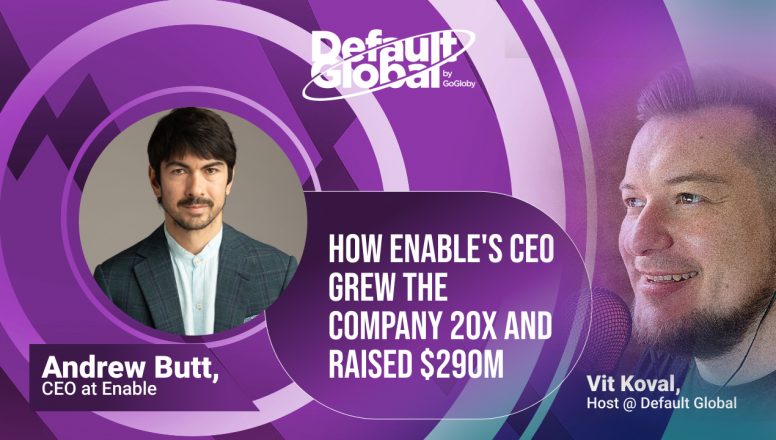Meet Iwo Szapar, Co-founder at Remote-how and Remote First Institute:
Meet Iwo Szapar, a remote work trailblazer and the Co-founder of Remote-how and Remote First Institute. Having begun his remote journey back in 2011, Iwo has worked with over 2,500 companies, facilitating their transition to remote and hybrid models. From leadership training to refining workflows, he’s been a game-changer in how we perceive work, prioritizing ‘how’ over ‘where’. His latest venture, the Remote First Institute, is a not-for-profit dedicated to promoting remote work best practices globally. With Iwo, the future of work looks flexible, adaptable, and exciting.
Listen Up: Iwo Szapar, Co-founder & Head of Remote at Remote-how — Full Podcast Episode on Spotify
Watch Now: Vit’s In-Depth Talk with Iwo Szapar
Quick Read: Iwo Szapar, Co-founder & Head of Remote at Remote-how, Interview Highlights
Can you give us some examples from your point of view, of what specific AI tools or things entrepreneurs who are global first or remote first can implement right away like it today?
Iwo mentions several AI tools and technologies that global-first or remote-first entrepreneurs can implement. He highlights the following areas:
- Communication and meetings: AI can optimize meeting processes by providing meeting recaps, transcripts, and other automated features.
- Knowledge sharing and documentation: Tools like Notion AI can help manage documentation, content creation, and streamlining processes.
- Research and analysis: Chat GPT-3.5 and future iterations can assist in problem-solving, providing insights, and answering questions related to specific job professions.
- Automation and productivity: AI can be integrated into various work areas to increase productivity and efficiency, including task automation and adherence to best practices.
“Instead of asking me how AI can help you, go to Chat GPT-4, describe that this is your job profession, and ask, for instance, like very actionable thing, like what kind of prompts you might be, you should be using on a daily basis to decrease the time on the manual work you’re doing, and you’ll figure this out.”
What are some common criteria or factors that companies should consider when hiring globally?
Iwo advises companies to consider the following factors when hiring globally:
- Conduct a remote work audit: Ensure the company’s current practices are well-established before hiring globally.
- Understand cultural differences: Companies should know the culture and market of the countries they plan to hire from and create an inclusive environment that supports cross-cultural collaboration.
- Invest resources in onboarding: Treat global hires as valuable team members, investing time and resources to integrate them fully into the company’s culture rather than treating them as random contractors.
“Make sure that these people will truly become a part of your company and not some kind of random contractors. They’re just executing your tasks.”
What is your opinion on hybrid work, and does it work effectively?
Iwo shares his perspective on hybrid work, stating that it is a temporary and relatively harder solution compared to remote-first or all-remote models. He compares it to hybrid cars, where it is not as ideal as fully electric cars but better than gas-powered ones. While hybrid work is feasible, it requires additional efforts to ensure equal treatment and an inclusive work environment. He suggests that companies, especially smaller ones, can more easily transition to remote-first or all-remote models.
“Hybrid is doable. It’s just harder… But companies up to a couple of hundred people, like this is the group that mainly went all remote during the pandemic. So it’s doable. It’s just a question of which one is easier for your setup.”
Could you suggest a few locations that you found particularly suitable for remote work and why?
Iwo recommends the following locations for digital nomads based on his personal experience:
- Vietnam, particularly Hoi An: He praises the community-oriented behavior of the people and mentions the excellent food, weather, and natural landscapes.
- Lisbon and surrounding areas in Portugal: Lisbon offers a vibrant digital nomad community, but he suggests exploring nearby locations such as Ericeira or the other side of the river towards Caparica for more affordable and less crowded options.
- Madeira and the Canary Islands: These locations in Portugal and Spain respectively have thriving digital nomad communities with opportunities for surfing and outdoor activities.
- Colombia and Mexico: Both countries provide interesting options for digital nomads, with Playa del Carmen in Mexico and various regions in Colombia being highlighted.
- Bulgaria and Romania: These countries in Central and Eastern Europe, particularly Bansko in Bulgaria, offer suitable infrastructure and communities for remote work.
- Other locations: Iwo also mentions Albania, Thailand (Koh Phangan), and the Yucatan Peninsula in Mexico as worth considering.
“The biggest reason [Vietnam is number one] is the difference in how people behave. It’s about community first and not me as an individual in our, let’s call it, Western world, and then it impacts a lot of the day-to-day stuff that is happening.”






